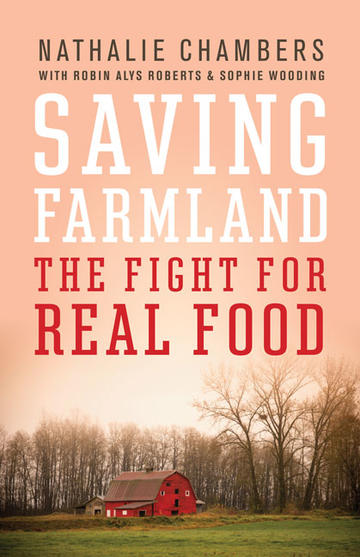When Nathalie Chambers and her husband, David, first took over Madrona Farm, 27 acres on southern Vancouver Island with a deep history, they never thought their small-scale agricultural business would blossom into an international political act. As pressures from heirs, land developers and industrial farmers grew alongside their rows of organically produced food, the Chambers took action. Considered by many to be revolutionary and by some to be rebellious, their story opened many eyes to the future of food.
Saving Farmland introduces readers to stories of lost farmland and bees saving lives. It shows how sustainability, ecosystems and biodiversity transcend the paradox of our own, man-made losses. Saving Farmland describes overcoming obstacles, choosing models, identifying vital farmland, building community and fundraising. Concluding stories of commonly shared land, international trusts, regained farmland and several heroes provide ongoing inspiration.
This practical book teems with fascinating history and facts. Saving Farmland will help us all support local farming and sustainable land development so we can indulge in good eating—forever.
Saving Farmland is an often exhilarating ride through farm activism and the frontiers of agro-ecology…. this is an inspiring manifesto, packed full of fascinating detail, that forcefully defends a vision of sustainable farming.
This is a very important book containing extensive research. It presents the perspective of, and the journey taken by, Nathalie Chambers in her passionate drive to make a difference in our world. The world needs more people like Nathalie and her husband, David. There are many lessons to be learned. Read it and be inspired.—Bill Turner, C.M., Partner/Director, Change Canada Consultants Ltd.; Chair, National Trust for Land and Culture (Canada); and Vice-Chair, International National Trusts Organization
Saving Farmland's human-anecdotal approach to responsible farming removes science from the equation and advocates, through storytelling, a blueprint for community action and the wisdom of farmers who live with, rather than against, nature to produce healthy food for a healthier planet.—Linda Rogers, journalist, poet, playwright and author of The Empress Letters and Friday Water
This influential book tells the inspiring story of one woman and a community that mobilized to protect an agricultural jewel in the heart of the urban landscape. Read it, share it and follow the example—working together to support local food systems and build truly sustainable communities.—Ben Isitt, historian, city councillor and author of From Victoria to Vladivostok: Canada's Siberian Expedition, 1917–19 and Militant Minority: British Columbia Workers and the Rise of a New Left, 1948–1972
I could scarcely tear myself away from this book. The words and stories resonate so completely with my own experiences and with everything I have learned about sustainability and food production. The book is, at once, compellingly personal and yet universal in its message and the lessons it brings. It focuses simultaneously on one particular farm in rural Saanich—the iconic Madrona Farm—and on the potential and promise of farms everywhere and anywhere. It is a book about a love affair with the land, and how to build strong, enduring relationships with each other and with our home places. Anyone with an interest in food and the future of the world will want to read it and will be inspired by it.—Nancy J. Turner, author of Ancient Pathways, Ancestral Knowledge: Ethnobotany and Ecological Wisdom of Indigenous Peoples of Northwestern North America and Saanich Ethnobotany: Culturally Important Plants of the W_SÁNEC People
Saving Farmland is ultimately about decision: to choose hope over global grief, community empowerment over corporate dominion, protection over peril, a sustainable feast over a slow road to famine.—Amy Reiswig, Focus Magazine



